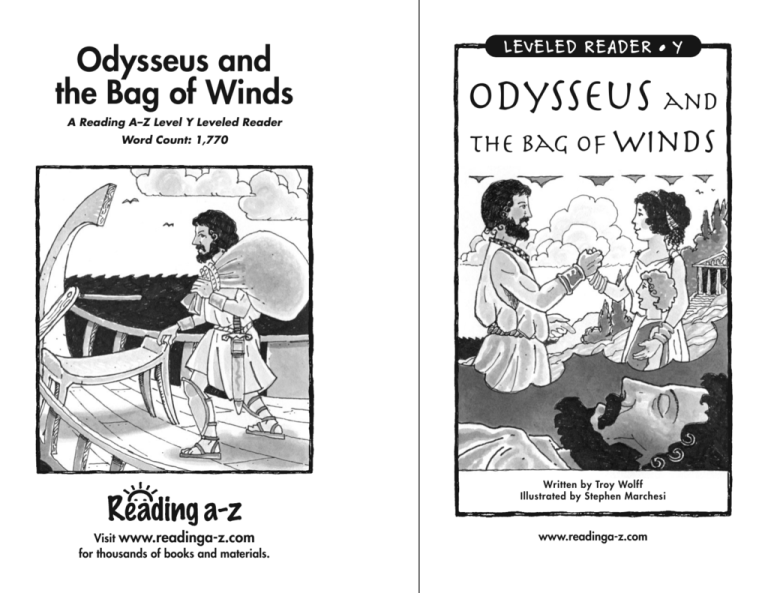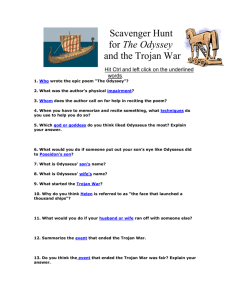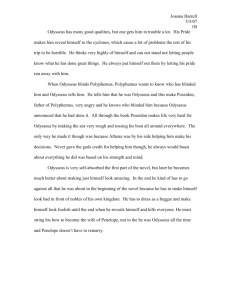
Odysseus and
the Bag of Winds
A Reading A–Z Level Y Leveled Reader
Word Count: 1,770
LEVELED READER • Y
Odysseus and
the Bag of Winds
Written by Troy Wolff
Illustrated by Stephen Marchesi
Visit www.readinga-z.com
for thousands of books and materials.
www.readinga-z.com
Odysseus and
the Bag of Winds
Written by Troy Wolff
Illustrated by Stephen Marchesi
Odysseus and the Bag of Winds
Level Y Leveled Reader
© 2007 LearningPage
Written by Troy Wolff
Illustrated by Stephen Marchesi
All rights reserved.
www.readinga-z.com
www.readinga-z.com
Correlation
LEVEL Y
Fountas & Pinnell
U
Reading Recovery 28
DRA
N/A
Prologue
N
Table of Contents
Prologue . . . . . . . . . . . . . . . . . . . . . . . . . . . . . . . . . . 4
A Visit with an Old Friend . . . . . . . . . . . . . . . . . . . 7
Aeolus’s Gift . . . . . . . . . . . . . . . . . . . . . . . . . . . . . . . 9
Almost Home . . . . . . . . . . . . . . . . . . . . . . . . . . . . . 11
Jealousy and Greed . . . . . . . . . . . . . . . . . . . . . . . . 14
Epilogue. . . . . . . . . . . . . . . . . . . . . . . . . . . . . . . . . . 18
Glossary . . . . . . . . . . . . . . . . . . . . . . . . . . . . . . . . . . 20
3
Every culture in
the world has its
own mythology.
Mythology is a set
of stories from a
culture’s distant
past, sometimes
based on true
events, but often
made up of
fantastic events and
supernatural
beings. The purpose
of mythology is to
entertain, teach
lessons on how to
live, and help explain how the world works. For
example, before humans developed scientific
explanations for natural events like earthquakes,
storms, and volcanoes, many ancient myths
explained these mysterious events through stories
of gods and humans. The ancient Greeks believed
that lightning occurred when Zeus, their supreme
being, was angry and wished to frighten or punish
mortals on Earth by throwing down thunderbolts
from high upon Mount Olympus.
4
In fact, the mythology of the ancient Greeks is
probably the best known of all world mythologies.
Greek stories of gods, heroes, and monsters have
been studied and enjoyed for more than 30
centuries, and they remain as popular today as
ever. Many of the stories of Greek mythology are
based on the events of a monumental ten-year
war between the armies of Greece and a powerful
city called Troy and its allies, located in what is
now the country of Turkey. All of the Greek gods
and many of the great Greek heroes took part in
this great war, which is believed to have occurred
in the 13th or 12th century B.C.
The poet Homer wrote a famous account of
the Trojan War called the
Iliad, but perhaps his
most famous poem of all
explores what happened
immediately after the
war ended. This
masterpiece, called the
Odyssey, followed the
adventures of one of the
greatest Greek heroes,
Odysseus, as he tried to
return home following
the war with Troy.
It was Odysseus
who won the war for
the Greeks by using
a large wooden horse
to trick the Trojans
into opening the
gates of their city, not
knowing that Greek
warriors lay hidden
inside.
Although his war strategy led to victory for
the Greeks, Odysseus still had many struggles to
endure before he would return home to his family.
After the war ended, Odysseus and his men began
sailing to Ithaca, their island home. What should
have been a simple trip became one of the most
famous journeys in all of literature. Odysseus’s
adventures have been read for centuries, and
Homer’s model of a hero’s journey back home has
been imitated in story after story, including movies
like Finding Nemo and O Brother, Where Art Thou and
adult novels like Don Quixote, A Farewell to Arms,
and Cold Mountain.
Odysseus’s journey home, which took ten years,
was filled with adventure after adventure. His
fantastic journey began with the tale of Aeolus and
the bag of winds.
5
6
A Visit with an Old Friend
After victoriously leaving Troy to sail for home,
Odysseus and his men stopped to visit Odysseus’s
friend, Aeolus (EE-oh-luhs), god of the winds.
Aeolus welcomed the victors. Odysseus and
his men, exhausted after the war, feasted and
celebrated for a full month with Aeolus. In return
for listening to Odysseus tell many stories of the
war, Aeolus offered Odysseus a magical gift to
speed him on his way home to Ithaca. The god of
the winds gathered all of the wild and dangerous
winds that might have blown Odysseus off course.
He forced these winds into a magical ox-hide bag,
sealing them with a golden cord. He left out only
one wind, a steady west wind, which would speed
Odysseus and his men homeward.
7
With much gratitude, Odysseus accepted the
gift, amazed that such power could be held in his
hands. Not trusting his men to understand such
a magical gift, Odysseus quietly stowed the bag
under the captain’s seat on his ship, and the men
prepared to sail for Ithaca.
8
They had also noticed the bag tied with the
golden cord sitting under Odysseus’s seat—the
bag that he seemed to be protecting very carefully.
But these concerns were not important to the men
at the time. Each of them was also anxious to
return home after the war. If Odysseus insisted on
steering the boat by himself, let him do it, they said to
themselves. It simply meant they each had more
time to sleep and dream of home.
Aeolus’s Gift
Aeolus’s gift worked perfectly at the beginning
of their journey. For nine days, Odysseus’s ship
carved a smooth and steady wake through the
blue waters of the Aegean Sea, always heading
westward toward Ithaca. With each passing hour,
Odysseus grew more anxious to see his home.
The war with Troy had lasted ten long years, and
during that time Odysseus had never once seen
his wife, Penelope, nor his young son.
He was so determined to return home that he
refused to relinquish the helm of his ship to
anyone else. For nine days and nights Odysseus
stayed at the helm with his eyes peering through
the salt spray to catch a glimpse of his homeland.
His men were a bit insulted at Odysseus’s lack of
trust in them. They were all good sailors. Of course
we can steer the ship just as well as Odysseus, they
often thought to themselves.
9
10
Almost Home
“Odysseus! Look!” Odysseus snapped out
of his daydreaming as one of his men cried out
from the bow of the ship. Shading his eyes from
the glare, Odysseus peered ahead. A faint mist
hovered above the surface of the water, and
scattered clouds dotted the sky, but sure enough,
as he stared more closely, a familiar outline rose
on the horizon. It was the jagged peaks of Ithaca!
Odysseus could recognize the shape of his beloved
island anywhere, and his heart leaped up into his
throat to see its familiar curves and points.
11
The rest of Odysseus’s men saw the same view
a few moments later, and the entire ship erupted
into cheers and laughter. Men hugged each other
and wiped tears of joy from their eyes. After ten
long years of separation from family and friends,
they would soon be back home—in perhaps only
a few more hours.
As the outline of Ithaca became sharper and
clearer, Odysseus’s spirits soared. He would
finally see his wife, Penelope, and his son,
Telemachus (tuh-LEM-a-kuhs). Telemachus was
an infant when Odysseus left for the war.
12
How Telemachus would have grown in ten years!
Would he even recognize his father? As these thoughts
entered Odysseus’s mind, his eyelids grew very
heavy. Ithaca is only hours away. We can see it plainly.
Surely I can shut my eyes now and leave the steering to
the men, Odysseus said to himself as he struggled to
stay awake. Turning to his most trusted companion,
Odysseus relinquished the helm, crawled over to a
nearby bench, and immediately fell sound asleep,
dreaming of Penelope and his son.
Jealousy and Greed
With Odysseus asleep and Ithaca within sight,
the men began talking quietly to themselves. “Look
at Odysseus there—so proud that he was unwilling
to let his trusted companions steer the ship.”
“We’ve fought together for ten years, and he
can’t even trust us to steer his ship.”
“You know, Odysseus is a great soldier, but he
did not share with us fairly the gifts won from Troy.”
“That’s true. With every victory, he always took
the lion’s share and left us with the rest.”
“Yes, and what about this gift from Aeolus?
Odysseus told us nothing of Aeolus’s treasure as
we left his island.”
“Look at that bag, tied with a golden cord.”
“Yes, why wouldn’t Odysseus tell us about
this bag?”
“Because he doesn’t want to share with us the
gifts of Aeolus.”
“Exactly! The bag is surely filled with gold and
jewels. Just look at that golden cord.”
“And look how carefully Odysseus protected
it from us.”
13
14
But with one tug of the golden cord, everything
changed. Raging, hurricane-force winds exploded
from the ox-hide bag. Bottled up for the last nine
days, winds from every direction furiously crashed
down and around Odysseus’s ship, tossing it
around on the waves as if it were a child’s toy.
The more the men talked, the angrier they
became at Odysseus and the more anxious they
became to open the ox-hide bag sitting under the
bench. With one last look at Odysseus sleeping
soundly on the bench, the men silently nodded
to each other and reached for the bag.
15
16
Odysseus’s sweet dreams of home turned
into a nightmare of howling winds and crashing
waves. Opening his eyes, he saw his men panicking,
rushing around the deck, waving their arms, and
covering their heads against the winds and waves.
At their feet, he saw the empty ox-hide bag.
“What have you done?” he cried. “Your greed
and jealousy have ruined us!”
Unable to hear Odysseus over the howling
winds, the men rushed over the ship, trying to
keep it from capsizing in the storm. Suddenly,
with a great snapping and ripping sound, the mast
came crashing down, pulling the sails with it.
Heartbroken, Odysseus watched helplessly as
his home began fading away in the distance. With
no sails on the ship and no way to steer, Odysseus
and his men were being blown over the furious
seas away from Ithaca, back in the direction from
which they’d come.
Oh, weak man! Why did I let myself sleep? Odysseus
cried to himself. Hours from home, and now this!
He prayed to Poseidon, god of the seas, to calm
the waves, and to Zeus, god of the sky, to end the
storm. However, his prayers went unanswered. The
gods had other things in store for Odysseus, and
he would not see his home for many more years.
17
Epilogue
Driven by the howling winds, Odysseus and
his men cowered in fear onboard their ship,
helpless to sail in the storm. Eventually, they
ended up back at Aeolus’s island. “Odysseus,
why are you here?” Aeolus asked, as the men
came ashore.
With great shame, Odysseus told Aeolus what
happened with the bag of winds. “It was not my
fault,” he said. “It was my men.” He pleaded
with Aeolus to help him once again.
However, despite Odysseus’s desperate
pleadings, Aeolus was firm. “Surely the gods
have decided to test you, Odysseus,” he said. “To
be turned away after getting so close to home can
only mean the gods are against you, and I cannot
go against the gods’ wishes. Good luck to you,
wise Odysseus. I cannot help you again.”
Aeolus was right. Odysseus would suffer
much bad luck, and struggle mightily, before he
would finally reach Ithaca. But these journeys
proved Odysseus to be the craftiest, most clever
mortal on Earth, and his journey became one of
the greatest stories ever told.
18
Glossary
capsizing (v.) overturning (p. 17)
endure (v.)
to survive, experience, or live
through (p. 6)
epilogue (v.) a short section at the end of a piece
of writing, often telling what finally
happens to the characters (p. 18)
helm (n.)
the wheel or handle used to steer a
ship (p. 9)
masterpiece
(n.)
an extraordinarily good piece of
writing or other creative work (p. 5)
mortals (n.)
human beings, who will die
eventually (p. 4)
pleaded (v.)
begged; asked with urgency (p. 18)
prologue (n.) a section at the beginning of piece
of writing, often one that provides
background information (p. 4)
Look for the Odyssey at your local library or
bookstore. Read about the many adventures of
Odysseus and how human traits such as jealousy,
pride, gluttony, and others prevented him and his
crew from returning home sooner.
19
relinquish
(v.)
to give something up or turn it over
to another person (p. 9)
stowed (v.)
put away; stored (p. 8)
wake (n.)
the track that a vessel leaves in
water as it moves (p. 9)
20









